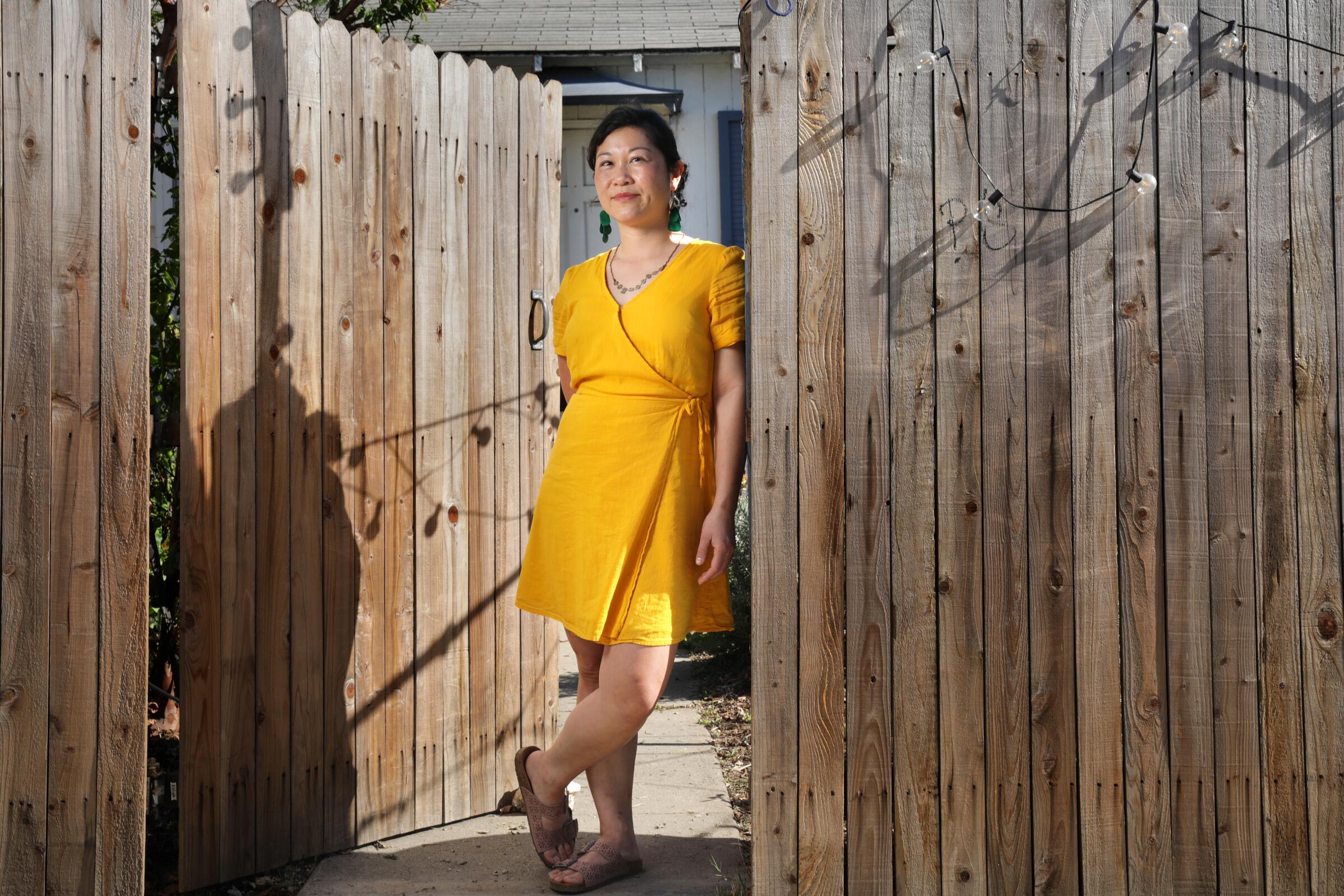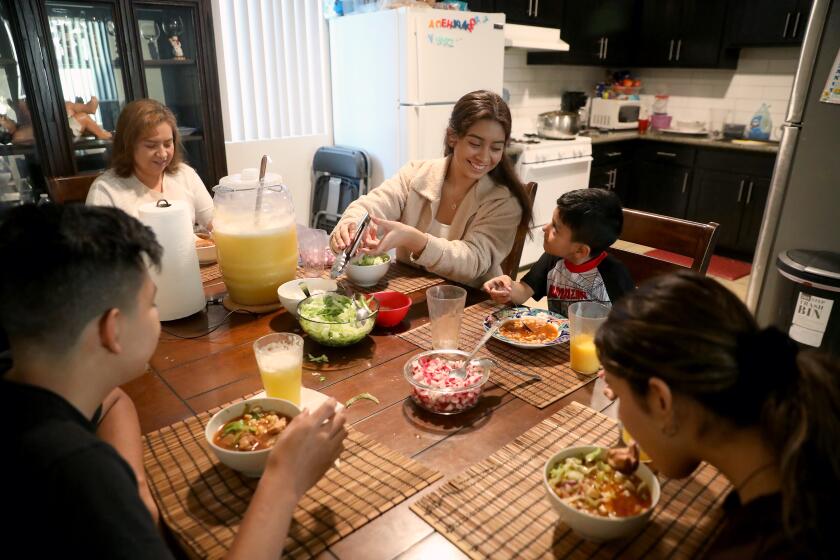Deborah Netburn covers faith, spirituality and joy for the Los Angeles Times. She started at The Times in 2006 and has worked across a wide range of sections including entertainment, home and garden, national news, technology and science.
- Share via
1
Kat Cheng opened the notes app on her phone and tried to summon the right words to say.
The 36-year-old photographer was writing an anonymous note to an unknown reader — a modern-day message in a bottle.
All she knew about the recipient was that he or she would read the letter while getting chemotherapy for the first time, and that owing to COVID restrictions, the reader would likely face that overwhelming moment alone.
Cheng, who completed her chemo treatment for breast cancer six months before the pandemic struck, struggled to strike the right tone.
She could share her own experience, but would it be relevant? She loved her nurses, but what if the reader didn’t?
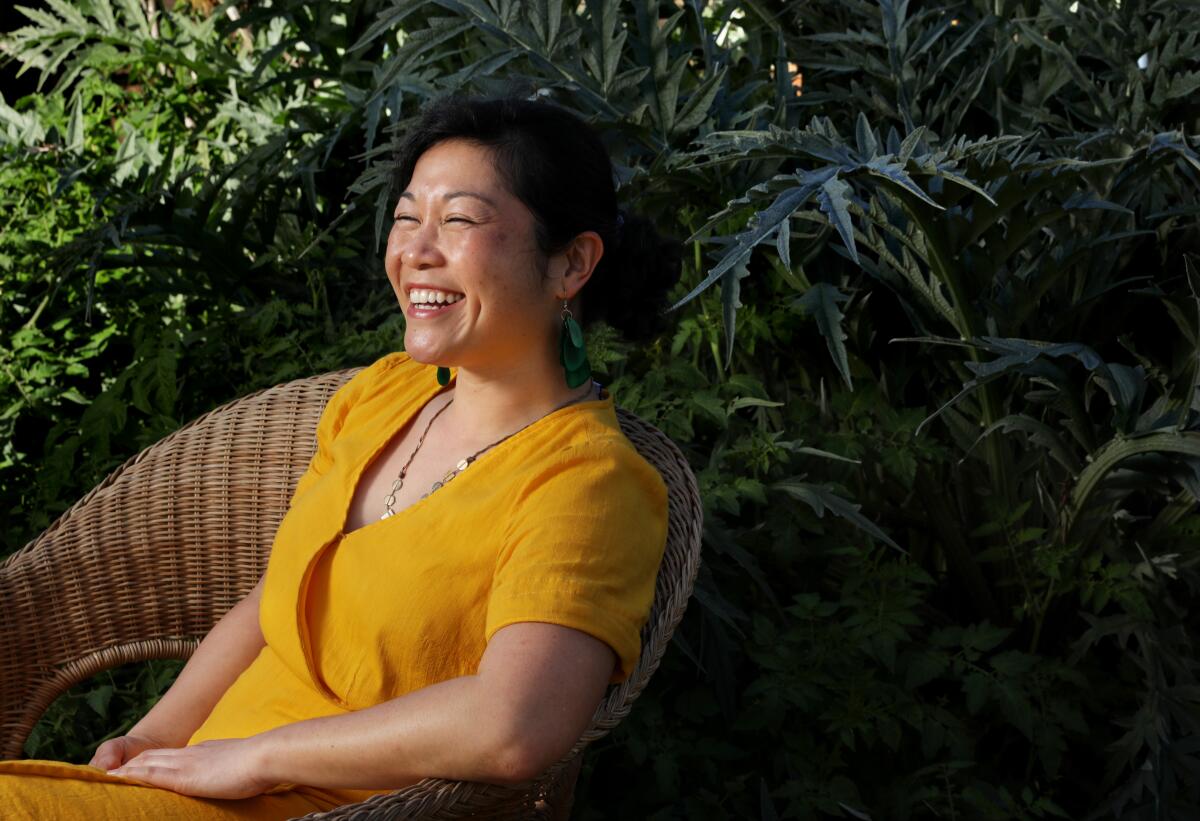
Kat Cheng’s letter to chemo patients was among 13 written through a program set up by a UCLA oncology center.
(Christina House / Los Angeles Times)
She didn’t want to offer trite aphorisms like “stay positive” or “it will all be over soon.” And she knew from experience that there is nothing worse than when others try to point out the silver lining of something like cancer.
Eventually, she began to write.
“Hey there friend,” she tapped out on her phone. “Though you’re in unenviably unique circumstances, you are not alone.”
Cheng’s letter was one of 13 missives written in the early days of the pandemic by people who had been through chemo at one of the hospitals or clinics run by UCLA Health. Since April, they’ve been included in the welcome packet given to new patients, along with information on the drugs about to be pumped into their bodies.
Each letter includes a song recommendation (and in one case, a Mary Oliver poem) to listen to during chemotherapy. Selections range from “Liebesfreud” (“Love’s Joy”) by Fritz Kreisler, to “anything Beyoncé” to “The Rain Song” by Led Zeppelin.
Cheng picked the meandering instrumental “Life” by composer and trumpeter Matthew Halsall because it reminded her of the quiet peace of an early Sunday morning.
“The cancer experience in general can feel so urgent and filled with endless to-do lists,” she said, “and those kinds of Sunday mornings feel far away.”
2
‘It’s a sacred process’
When Sydney Siegel, a social worker at the Simms/Mann-UCLA Center for Integrative Oncology, learned in March that UCLA’s infusion clinics would no longer allow visitors — even for first-time chemo patients — she was determined to help offset that loss of support.
“For many people, having a loved one by your side on that first day — whether a family member or friend — that physical presence is so important,” she said.
As she brainstormed with co-workers, Siegel recalled the many patients she’d seen in counseling who had asked what they could do to support others with cancer. She also thought about a box she keeps at home; it’s filled with letters from friends, family and co-workers.
“I consider letters to be such a precious gift,” she said. “It is your own unique thoughts and life experience committed to paper, and then committed to another human. It’s a sacred process.”
I know the first day of chemo can be daunting. I was there....
— Dale Barnes
Siegel had another realization: Skilled physicians, and even her patients’ closest family members and friends, can’t fully comprehend what it feels like to have a cancer diagnosis if it hasn’t happened to them.
“It’s kind of humbling as a clinician to realize that the connection and support in the midst of all these distancing measures is not going to come through me,” Siegel said. “In this moment, it’s other patients who can support these patients better than I can.”
And so she hatched a plan for the letters project. It would be called From the Chemo Chair: From My Heart to Your Heart.
After discussing the idea with Kauser Ahmed, a psychologist and director of the Simms/Mann Center, Siegel and her colleagues searched for writers. They asked that the letters not include identifying details — including gender, age or race — and that they not be a direct retelling of the writer’s experience. Other than that, they kept it broad.
‘My parents’ worries became my own.’ L.A. students have taken on grueling work to support their families during the pandemic.
“I wanted to let them get creative with their format,” she said.
Siegel hoped the letters would help new patients. What she didn’t expect was how the project would affect the writers.
Hello Dear One!
I was sitting in a chair, like yours, maybe in the same chair, for the first time, 9 years ago. I did not know what to expect. I was anxious, but also a bit curious. I wanted to see how this magic liquid would bring some discipline to my “confused cells” and teach them how to make the right proteins and not proliferate the wrong ones.
3
‘A fellow traveler’
Tulin Mangir, 70, is a retired electrical engineer and professor who once worked on space missions for NASA. She started her chemo treatments nearly a decade ago after being diagnosed with multiple myeloma, a type of blood cancer that affects plasma cells. Her original life expectancy after diagnosis was 24 to 38 months.
“So, what are you going to do?” she said. “You take the poison and be happy about it.”
Mangir’s disease cannot be cured. Treatments work for a while, then they stop working. For Mangir, writing the letter offered a chance to reflect on the totality of her cancer experience.
“It’s not enough to survive, you have to thrive,” she said. “And that is a mental act.”
As she sat down to handwrite her draft, she knew she wanted her letter to be both comforting and informative — full of the many things that helped her along the way. Most of all, she wanted to encourage the reader to practice acceptance.
Each of us are different, however, welcoming and trusting this process, this helpful liquid into our bodies helps our healing. Try to see it as a helpful ally!
“Not being scared is not an option. You will be scared, you will be anxious,” she said. “But you have to be clear in your mind that this is going to be healing for you. You can believe it will work instead of being suspicious, negative and pessimistic.”
She also shared self-care tips: Guided meditations, journaling, focusing on other people instead of her illness, and trying to remain thankful.
I am grateful for this life, for this place, for the ability to receive this treatment! Gratitude keeps me going most days, and when I put my head on my pillow I feel grateful, as I do when I open my eyes in the morning!
This is a dance between the “disease” and us! Kind of peaceful coexistence....
She signed it: A fellow traveler
4
‘Cry if you need to, but laugh when you can’
Dale Barnes, 72, began her career as an oncology nurse in the ‘80s and now works as a certified legal nurse consultant and a clinical educator at a home healthcare agency. She was diagnosed with ovarian cancer in 2014.
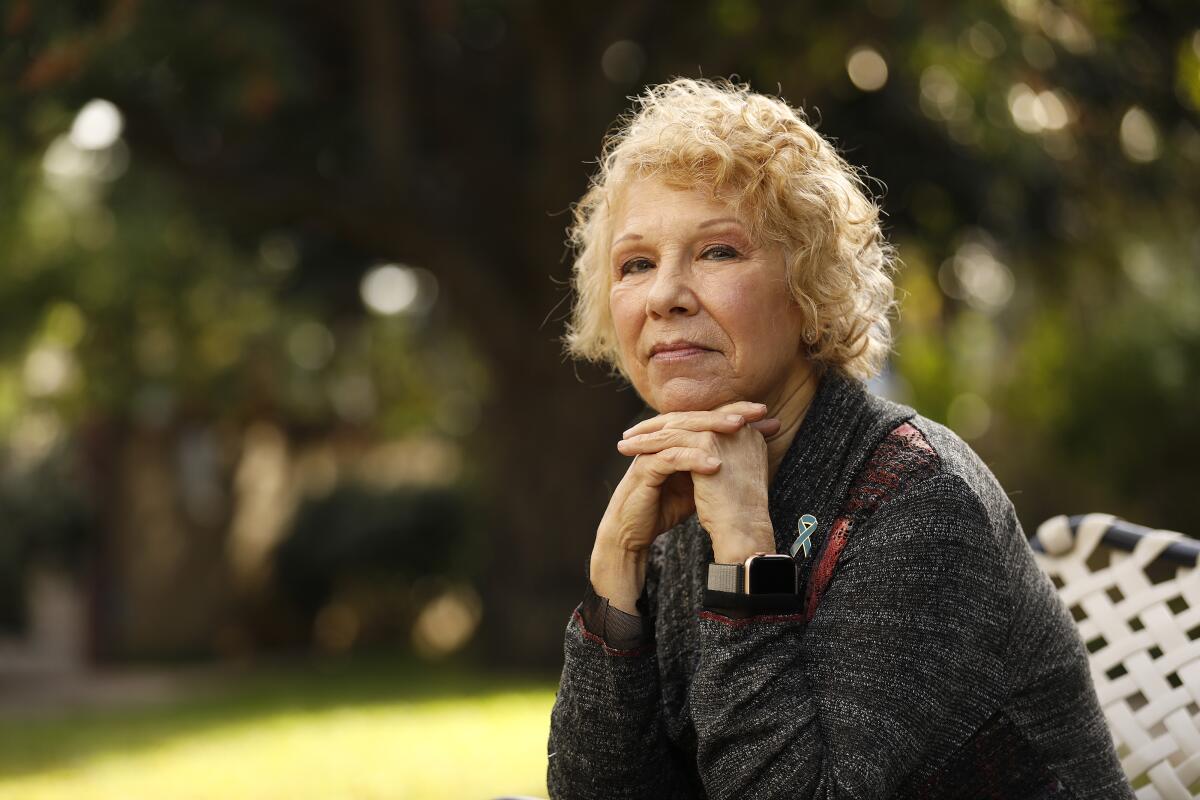
Having been an oncology nurse, Dale Barnes thought she understood what it was like to have cancer. But she didn’t truly understand, she said, until she had it herself.
(Al Seib / Los Angeles Times)
Before her illness, Barnes thought she understood what it was like to have cancer. It turned out she was wrong.
“I thought I really got it, but I really didn’t,” she said. “Not until I went through it myself.”
Over the course of her treatment, Barnes found herself pushing away well-meaning friends who showered her with sympathy. “It was the people who said, ‘Poor Dale, poor Dale,’” she said. “I didn’t want any of that.”
She also bristled when people told her how brave she was.
“I wanted to gag,” she said. “This isn’t about being brave. You have a choice: you can break down and wallow in misery, or you can put one foot in front of another and move forward.”
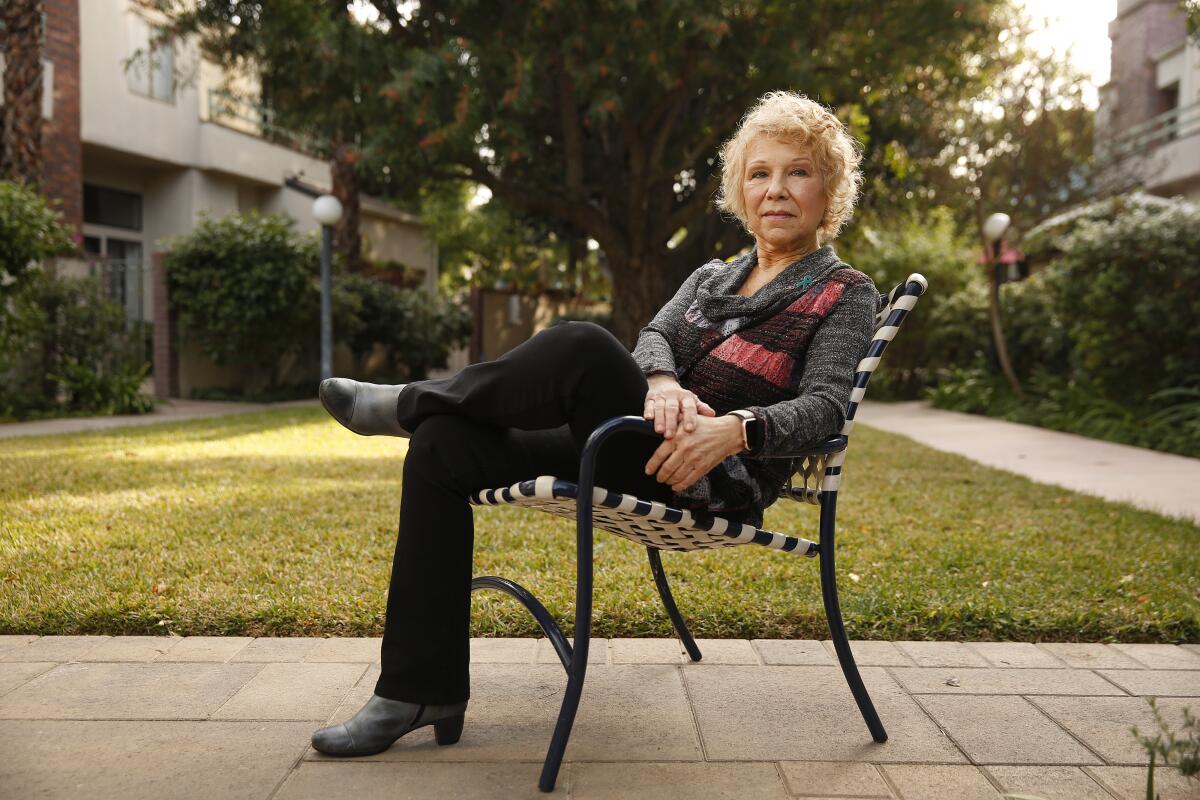
Barnes knew the value of receiving support from someone who’d been through the chemo process, so she agreed to write letters to patients.
(Al Seib / Los Angeles Times)
What she did value was being supported by those who knew firsthand what she was experiencing, especially other cancer patients she met in support groups.
“I met people I probably would never ever have met,” she said. “And that was a real gift in my life.”
So when the chaplain at Simms/Mann asked if she would contribute a letter, she instantly said, “Yes.”
“I would gladly help anyone who is going through what I went through,” she said. “And at this point, I know what not to say.”
The letter flowed right out of her.
I know the first day of chemo can be daunting. I was there....
My daily mantra was (and still is) “one foot in front of the other.” Just keep going. You are going through a difficult time of your life, compounded by the current world crisis. Cry if you need to, but laugh when you can.
5
‘You are not alone’
A few weeks after California schools shut down, Jennifer Kelly, 40, was putting her 4-year-old to sleep when she rolled over funny and her arm brushed something on her breast.
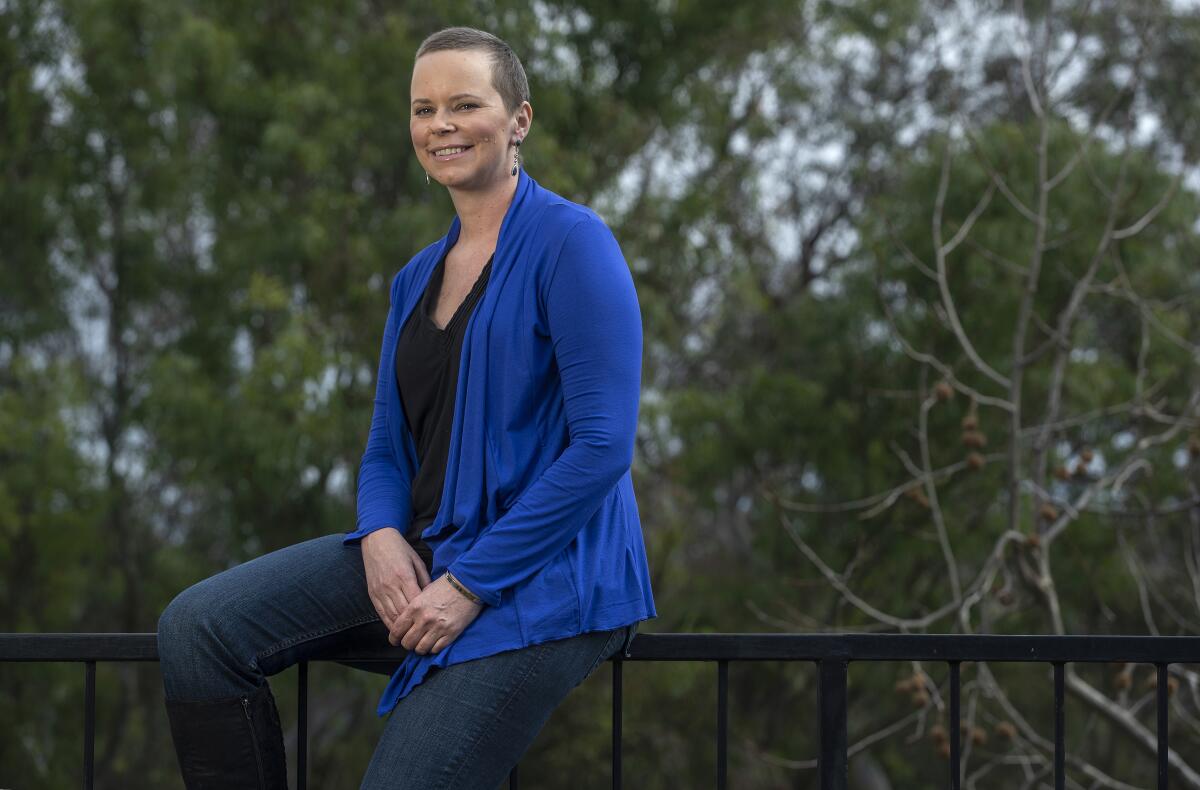
Jennifer Kelly, a veterinarian and mother of 2, was diagnosed with breast cancer in June 2020, when pandemic rules limited visitors in hospitals.
(Mel Melcon / Los Angeles Times)
“I was like, what the hell is that?” she said.
On June 4 she had an answer: stage 3 invasive ductal carcinoma, an aggressive form of breast cancer.
Two weeks later she started chemo at a UCLA clinic in Westlake. At the time, UCLA Health had changed its protocol and was allowing new patients to bring one visitor with them on their first day of chemo. Kelly arrived with her sister, a social worker based in Oxnard.
While Kelly talked to the nurses, her sister shuffled through the packet of papers they received when they arrived. Before long, her sister was reading the letters, tears streaming down her face.
She passed the letters to Kelly, and soon she was crying as well. She felt compassion and solidarity with each opening line:
Just two years ago, I was where you are now, and I know that facing chemotherapy for the first time is frightening....
To my unknown friend on your first day of chemotherapy....
A year ago, I was you — walking into the infusion room for the first time, wondering what lay before me and how I would handle it....
I know this is probably very scary, especially right now....
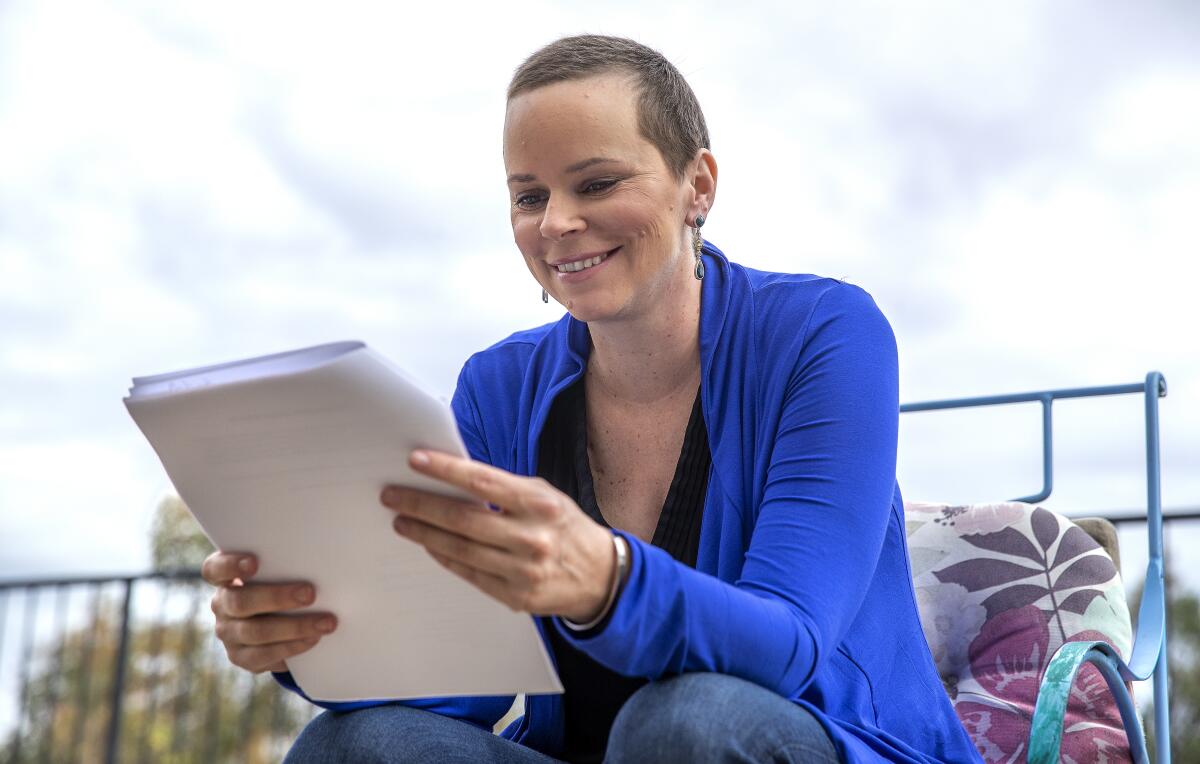
On her first day of chemotherapy, Jennifer Kelly received a packet of papers that included letters from cancer survivors that brought her to tears.
(Mel Melcon / Los Angeles Times)
“They were so awesome and comforting,” Kelly said. “It’s just different when it’s someone who’s been through it. Everybody says the same thing — just be strong, you’re going to get through this — la la la. But if you haven’t been through it, it just doesn’t hold as much weight.”
There’s a whole community here for you right now and always.
You are not alone. I am with you.
Sending you a warm squeeze, friend.
